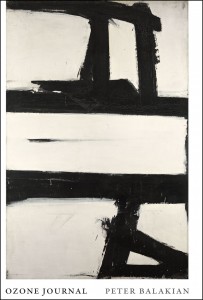Peter Balakian’s Ozone Journal wins the 2016 Pulitzer Prize

Congrats to Phoenix Poet Peter Balakian—his latest collection Ozone Journal took home the 2016 Pulitzer Prize for poetry, noted by the Pulitzer committee in their citation as, “poems that bear witness to the old losses and tragedies that undergird a global age of danger and uncertainty.” From a profile of Balakian at the Washington Post:
“I’m interested in the collage form,” Balakian said. “I’m exploring, pushing the form of poetry, pushing it to have more stakes and more openness to the complexity of contemporary experience.”
He describes poetry as living in “the speech-tongue-voice syntax of language’s music.” That, he says, gives the form unique power. “Any time you’re in the domain of the poem, you’re dealing with the most compressed and nuanced language that can be made. I believe that this affords us the possibility of going into a deeper place than any other literary art — deeper places of psychic, cultural and social reality.”
From the book’s titular poem:
Bach’s cantata in B-flat minor in the cassette,
we lounged under the greenhouse-sky, the UVBs hacking
at the acids and oxides and then I could hear the difference
between an oboe and a bassoon
at the river’s edge under cover—
trees breathed in our respiration;
there was something on the other side of the river,
something both of us were itching toward—
radical bonds were broken, history became science.
We were never the same.
And, as the jacket description notes:
The title poem of Peter Balakian’s Ozone Journal is a sequence of fifty-four short sections, each a poem in itself, recounting the speaker’s memory of excavating the bones of Armenian genocide victims in the Syrian desert with a crew of television journalists in 2009. These memories spark others—the dissolution of his marriage, his life as a young single parent in Manhattan in the nineties, visits and conversations with a cousin dying of AIDS—creating a montage that has the feel of history as lived experience. Bookending this sequence are shorter lyrics that span times and locations, from Nairobi to the Native American villages of New Mexico. In the dynamic, sensual language of these poems, we are reminded that the history of atrocity, trauma, and forgetting is both global and ancient; but we are reminded, too, of the beauty and richness of culture and the resilience of love.
To read more about Ozone Journal, click here.